2023-2024学年牛津深圳版九年级上册 Module 1 Unit 1 Wise men in history 第3课时 课件 (共41张PPT)
文档属性
| 名称 | 2023-2024学年牛津深圳版九年级上册 Module 1 Unit 1 Wise men in history 第3课时 课件 (共41张PPT) | 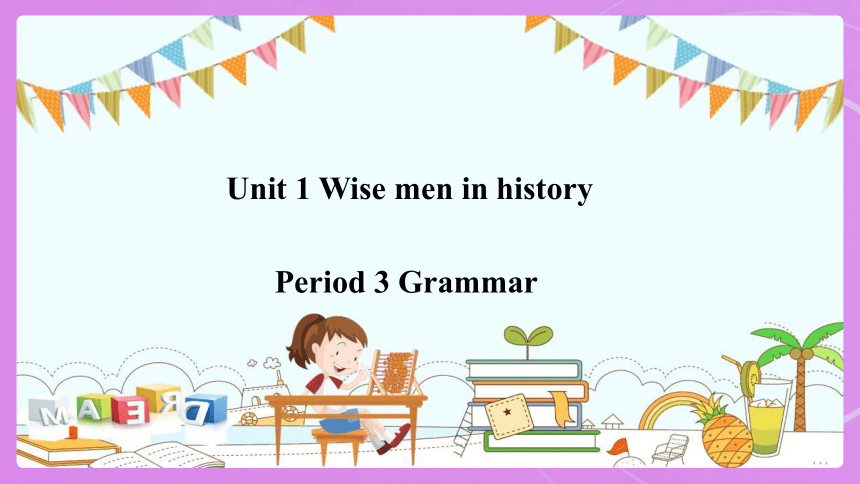 | |
| 格式 | pptx | ||
| 文件大小 | 1011.3KB | ||
| 资源类型 | 教案 | ||
| 版本资源 | 牛津深圳版 | ||
| 科目 | 英语 | ||
| 更新时间 | 2023-09-03 22:50:12 | ||
图片预览


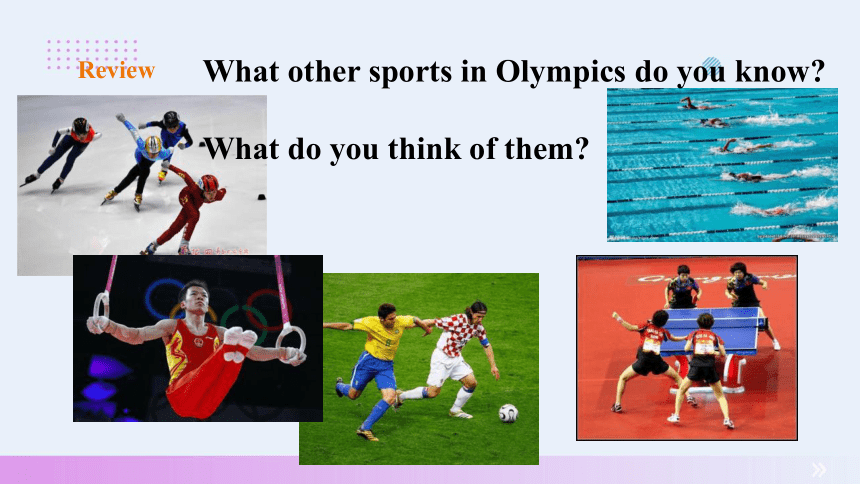
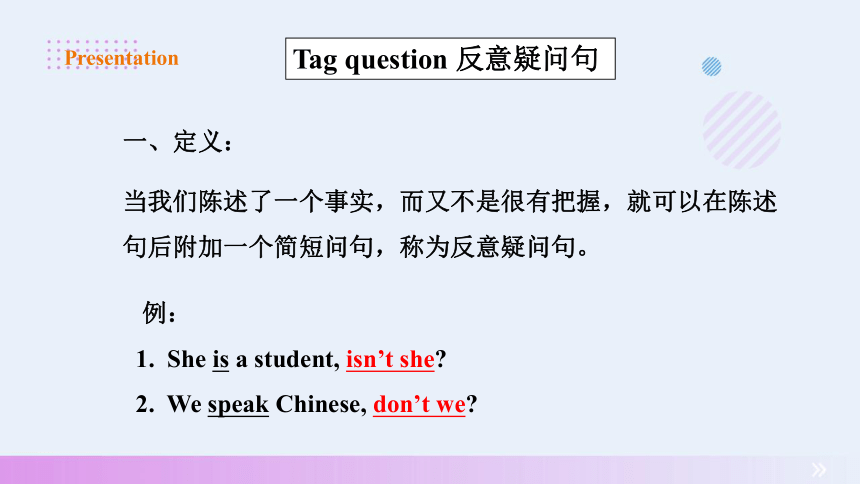
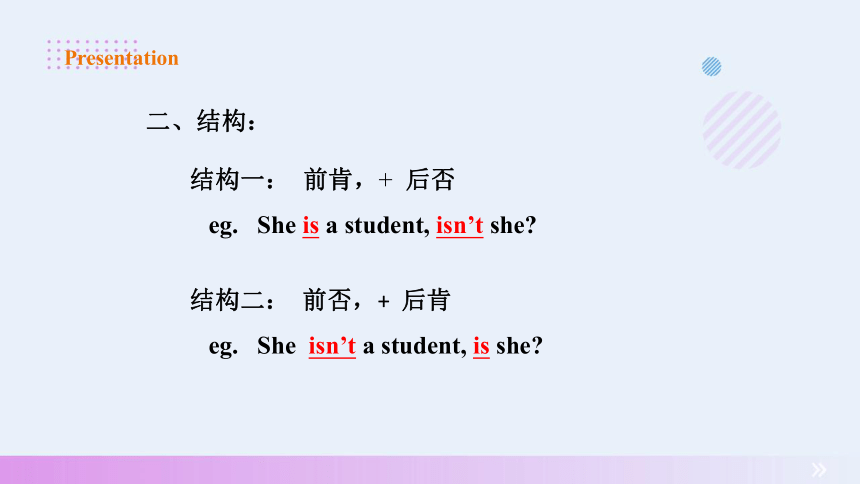
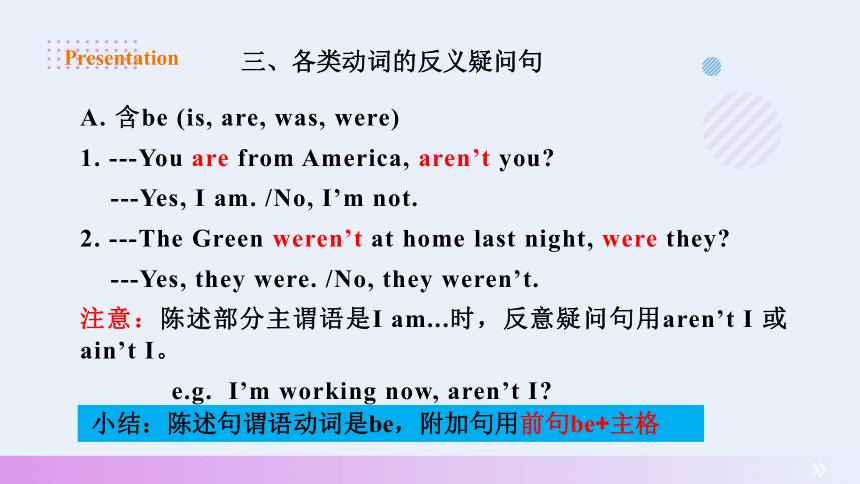
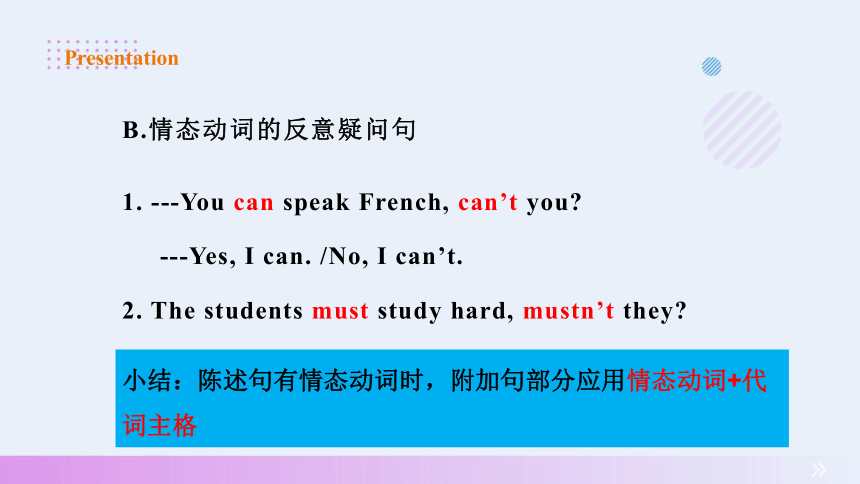
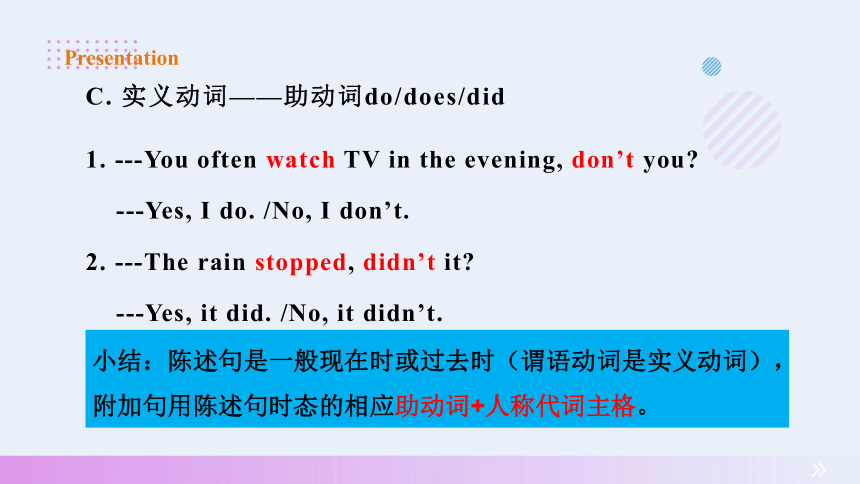
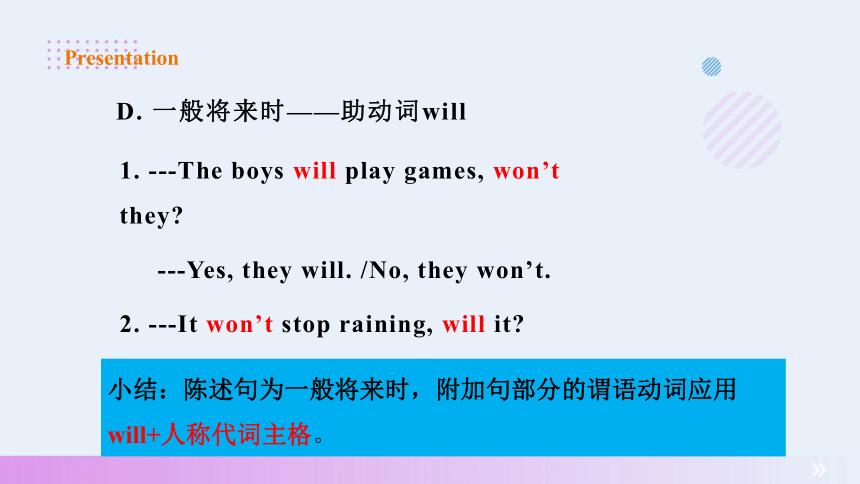
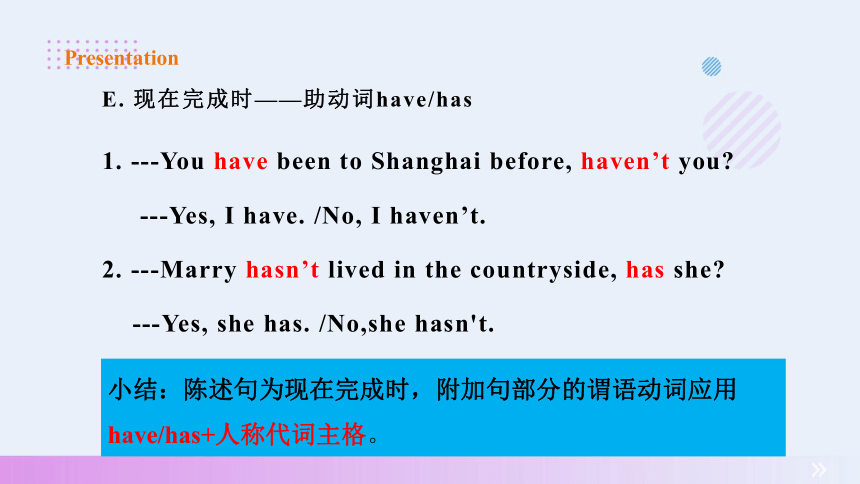
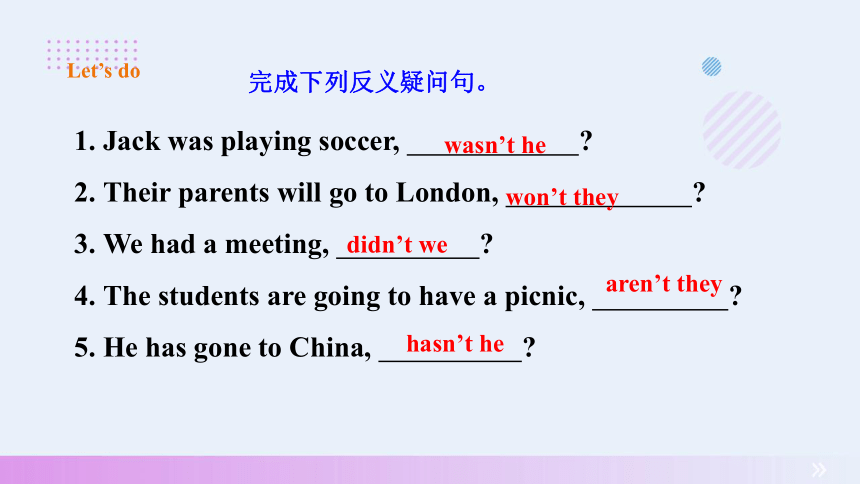
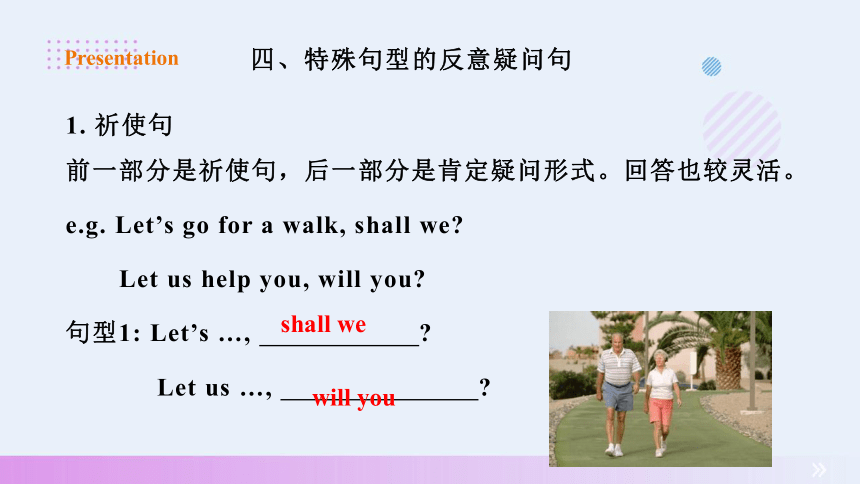
文档简介
(共41张PPT)
Unit 1 Wise men in history
Period 3 Grammar
Review
Look at the pictures and talk about them:
What sports are they
Do you like them
Review
What other sports in Olympics do you know
What do you think of them
Tag question 反意疑问句
一、定义:
当我们陈述了一个事实,而又不是很有把握,就可以在陈述句后附加一个简短问句,称为反意疑问句。
例:
1. She is a student, isn’t she
2. We speak Chinese, don’t we
Presentation
二、结构:
结构一: 前肯,+ 后否
eg. She is a student, isn’t she
结构二: 前否,+ 后肯
eg. She isn’t a student, is she
Presentation
A. 含be (is, are, was, were)
1. ---You are from America, aren’t you
---Yes, I am. /No, I’m not.
2. ---The Green weren’t at home last night, were they
---Yes, they were. /No, they weren’t.
注意:陈述部分主谓语是I am...时,反意疑问句用aren’t I 或ain’t I。
e.g. I’m working now, aren’t I
三、各类动词的反义疑问句
小结:陈述句谓语动词是be,附加句用前句be+主格
Presentation
B.情态动词的反意疑问句
1. ---You can speak French, can’t you
---Yes, I can. /No, I can’t.
2. The students must study hard, mustn’t they
小结:陈述句有情态动词时,附加句部分应用情态动词+代词主格
Presentation
C. 实义动词——助动词do/does/did
1. ---You often watch TV in the evening, don’t you
---Yes, I do. /No, I don’t.
2. ---The rain stopped, didn’t it
---Yes, it did. /No, it didn’t.
小结:陈述句是一般现在时或过去时(谓语动词是实义动词),附加句用陈述句时态的相应助动词+人称代词主格。
Presentation
D. 一般将来时——助动词will
1. ---The boys will play games, won’t they
---Yes, they will. /No, they won’t.
2. ---It won’t stop raining, will it
---Yes, it will. /No, it won’t.
小结:陈述句为一般将来时,附加句部分的谓语动词应用will+人称代词主格。
Presentation
E. 现在完成时——助动词have/has
1. ---You have been to Shanghai before, haven’t you
---Yes, I have. /No, I haven’t.
2. ---Marry hasn’t lived in the countryside, has she
---Yes, she has. /No,she hasn't.
小结:陈述句为现在完成时,附加句部分的谓语动词应用have/has+人称代词主格。
Presentation
Let’s do
1. Jack was playing soccer,
2. Their parents will go to London,
3. We had a meeting,
4. The students are going to have a picnic,
5. He has gone to China,
wasn’t he
won’t they
didn’t we
aren’t they
hasn’t he
完成下列反义疑问句。
四、特殊句型的反意疑问句
1. 祈使句
前一部分是祈使句,后一部分是肯定疑问形式。回答也较灵活。
e.g. Let’s go for a walk, shall we
Let us help you, will you
句型1: Let’s …,
Let us …,
Presentation
shall we
will you
①Come into the classroom, will you
②Please be careful, will you
③Be quick, will you
④Don’t be late again, will you
⑤Do it at once, will you
句型2: 其它形式祈使句+ (表示请求)或 (表示提醒)
Presentation
will you
won’t you
2. 感叹句
其反意疑问句常根据其 来确定。
①How time flies, doesn’t it
②How tall the buildings are, aren’t they
③How hard it’s raining, isn’t it
④What a tall man, isn’t he
⑤What tall buildings, aren’t they
Presentation
主、谓语
1.Open your books,
2.Don’t go across the road now,
3.Let’s wait,
4.Let us have a rest,
won’t/will you
will you
shall we
will you
Let’s do
完成下列反义疑问句。
五、特殊词类做主语的反意疑问句
1. 不定代词
①陈述部分主语是everything, nothing, something 等时,反意疑问句的主语应用代词 。
e.g. Something is wrong with my radio, isn’t it
②陈述部分主语是 everybody, anybody, somebody, nobody, none, neither 时, 其反意疑问句的主语需用复数代词 。
e.g. Everyone is here, aren’t they
e.g. No one knows about it, do they
Presentation
it
they
2. 指示代词
①陈述部分的主语是指示代词this或that时,反意疑问句的主语____
e.g. This is a plane, isn’t it
②当陈述部分的主语是指示代词these或those时,其反意疑问句的主语用 。
e.g. These are grapes, aren’t they
Presentation
it
they
3. there be句型
陈述部分是there be句型时,其反意疑问句中要用 。
1. ---There aren’t any children in the room, are there
---Yes, there are. /No, there aren’t.
2. ---There will be a basketball match tomorrow, won’t there
---Yes, there will. /No, there won’t.
Presentation
there
4. 当陈述部分主语是从句、不定式(短语)、动词-ing形式时,反意疑问句主语应用 。
e.g. What you need is more important, isn’t it
注意:
当陈述部分含I think (believe, suppose...)that... 结构时,其反意疑问句须与 句的主、谓语保持一致,主句的主语必须是第一人称。
e.g. I don’t think he will come, will he
I believe they can finish the work in time, can’t they
Presentation
it
从
1. Watching TV too much is bad for us ,_________
2. Nothing is wrong with the watch, _________
3. There is a pen on the chair,
4. I don’t think Tom is at home, __________
isn’t it
is it
is he
isn't there
Let’s do
完成下列反义疑问句。
五、反义疑问句注意事项
陈述部分如果有否定意义的词,这时疑问部分要用肯定形式。
陈述部分含有以下这些含有否定意义的词时:
few, little, seldom, hardly, never, not, no, no one, nobody, nothing, none, neither等,其反意疑问句需用肯定结构。
Presentation
e.g. ①---You have never been to Beijing, have you
---Yes, I have. /No, I haven’t.
② ---Mr. Fat has few friends here, does he
---Yes, he does. /No, he doesn’t.
③ ---There is little milk in the bottle, is there
---Yes, there is. /No, there isn’t.
④ ---He could do nothing, could he
---Yes, he could. /No, he couldn’t.
Presentation
2.当陈述部分含有un-, in-, im-, il-, ir-, dis-等否定前缀或less等否定后缀构成的派生词时,附加疑问则用否定形式。
e.g. She is unhappy, isn’t she
She dislikes it, doesn’t she
Presentation
3. 回答反意疑问句的问题时,要注意根据事情情况回答.只要事实是肯定的,就用Yes回答,如果事实是否定的,就用No回答,不管第一部分句子是肯定或否定。Yes/ No 和之后的简略回答必须一致。(注意中文和英文思维的差异)
1. The book isn’t so boring, is it
___________. It’s the worst book I have ever read.
___________. It’s fun, I think.
2. You haven’t been to the U. S. , have you
______________. I want to have a visit one day.
______________. I have been there three times.
Yes, it is.
No, it isn’t.
No, I haven’t.
Yes, I have.
Presentation
1. They have never visited his home,
2. There are few apples in the basket,
3. He can hardly swim,
4. It has no legs,
5. There is little water in the glass,
have they
are there
can he
does it
is there
Let’s do
完成下列反义疑问句。
Queen: You aren’t happy, _________ What happened.
King: It’s my new crown. Take a look at it,_________
Queen: It looks beautiful, _________ What’s wrong with it
King: It isn’t made completely of gold.That’s why I’m angry.
Queen: The crown maker tricked you,__________ How did you find out
King: Archimedes told me. Let’s have dinner with him tonight,
__________
Queen: OK.
are you
will you
doesn’t it
King Hiero showed the crown to the queen plete their conversation with question tags.
didn’t he
shall we
Let’s do
一、陈述句
定义:陈述一个事实或者说话人的看法。
分类:肯定句与否定句
1.肯定句
He is a student.
He gets up at six.
2.否定句
She isn't from China.(be +not)
She can't come.(情态动词+not)
They don't like blue.(do/does +not)
注意:含有否定意义词的句子,如no, no one, nothing, never, little, few, neither, nor, none, seldom, hardly也是否定句。
Presentation
二、疑问句
一般疑问句
特殊疑问句
选择疑问句
反意疑问句
疑问句
定义:疑问句的主要交际功能是提出问题,询问情况。
分类:
Presentation
1. 一般疑问句通常用来询问一件事情是否属实。答句通常是“yes或no”。
e.g. ①--Is this your bag
--Yes, it is.
---No, it isn't.
②---Can you make yourself understood in America
--Yes, I can.
---No, I can't.
③---Does Jane like English
--Yes, she does.
---No, she doesn't.
Presentation
2. 对句中某一成分提问的句子叫特殊疑问句。
句式: 特殊疑问词 + 一般疑问句
疑问词分为三类
疑问代词: what, who, which, whose, who
疑问词组: what(which, whose)+名词
疑问副词: when, where, why, how
Presentation
Ⅰ. what
问姓名;
问物品;
问职业;
what about 用来征求意见或询问消息,相当于how about
what colour 问颜色;
what class 问哪个班级;
what size 问尺寸
Presentation
Ⅱ. who---Person (对人提问)
e.g. -- Who will visit you tomorrow
-- My father.
Ⅲ. when---Time (对时间提问)
e.g. -- When will you finish your homework
-- Tomorrow.
Ⅳ. where---Place (询问地点、场所)
e.g. Where do you live?
Ⅴ. why---Reason (对原因提问)
e.g. -- Why are you late
-- Because I missed the bus.
Presentation
Ⅵ. how
(1) How… 询问做某事的方法、手段及健康、天气……
e.g. ① - How do you go to school?(问方式)
- I go to school by bus.
② - How are you?(问健康)
-I’m fine. Thank you!
③ How is the weather today?(问天气)
(2) How+形容词(副词)...? 询问年龄、身高、数量、次数、距离……
e.g. How much are they (问价格)
Presentation
词组 词义 例句
How many 多少(可数) How many apples do you want
How much 多少(不可数) How much meat shall I buy
How old 多大(岁数) How old are you
How long 多长时间(多久) How long will you stay here
多长(长度) How long is the river
How often 多久(频率) How often do you visit your grandmother
How soon 多快(时间) How soon will he be back
How far 多远(距离) How far is it from A to B
Presentation
3. 选择疑问句:提出两种或两种以上的情况,要求对方选择一种情况回答的问句。两种情况之间用or连接。回答不用yes/no,用一个完整的句子或其省略形式。
分类: 一般选择疑问句和特殊选择疑问句
1. 一般选择疑问句:一般疑问句+or+被选择部分?
e.g. -- Do you like apples or pears
-- I like pears.
2. 特殊选择疑问句:特殊疑问句, +A or B
e.g. -- Which would you like better, tea or coffee
-- I like coffee.
Presentation
定义:祈使句表示命令、请求、建议、或劝告等等。主语通常被省略,谓语动词用原形。
1.肯定的祈使句
1) 以动词原形开头(省略主语)
e.g. Open the door.
2) 动词前加do, 加强语气。表“务必,一定”
e.g. Do look out! 一定要小心!
2. 否定祈使句
1) Don't +动词原形
e.g. Don't open the door.
三、祈使句
Presentation
2) Let's + not + 动词原形
e.g. Let’s not speak loudly!
注意:祈使句答语用 will/ won’t
e.g.
① ---Remember to bring your homework to school tomorrow.
---OK, I will.
② Don't forget to bring your homework to school tomorrow.
---OK, I won’t.
Presentation
四、感叹句
What a /beautiful girl (she is )!
What an /easy question (it is)!
What/ beautiful girls (they are) !
What /bad weather (it is )!
what 用法归纳:
① __________________________________________________
② __________________________________________________
③ __________________________________________________
What+a/an+adj.+可数名词的单数形式(+主语+谓语)!
What+adj.+可数名词的复数形式(+主语+谓语)!
What+adj.+不可数名词(+主语+谓语)!
Presentation
How well you look!
How kind you are!
How wonderful a film(it is)!
How time flies!
how 用法归纳:
① __________________________________________________
② __________________________________________________
③ __________________________________________________
How+主语+谓语!
How+adj./adv.+主语+谓语!
How+adj./adv.+a/an+可数名词的单数形式(+主语+谓语)!
Presentation
How can I find out___
The crown is nice___
How wonderful___
The king was not happy___
Please close the window___
What a nice crown___
This is difficult, isn’t it___
Leave me alone___
Add a full stop (.), a question mark ( ) or an exclamation mark (!) to the end of the following sentences.
.
!
.
.
!
.
Let’s do
(1) How did Archimedes discover the truth
(2) He’s so clever, isn’t he
(3) King Hiero sent me to prison.
(4) What a lonely place this is!
(5) Will he let me out soon
(6) I don’t want to stay here any longer.
(7) Please let me out!
1. ___________
2. ___________
3. _______________
4. ___________
5. ______________
6. _______________
7. ___________
Wh-question
Tag question
Positive statement
Imperatives
Yes/No question
Negative statement
Imperatives
Look at the sentences below and label the sentence types.
Let’s do
Unit 1 Wise men in history
Period 3 Grammar
Review
Look at the pictures and talk about them:
What sports are they
Do you like them
Review
What other sports in Olympics do you know
What do you think of them
Tag question 反意疑问句
一、定义:
当我们陈述了一个事实,而又不是很有把握,就可以在陈述句后附加一个简短问句,称为反意疑问句。
例:
1. She is a student, isn’t she
2. We speak Chinese, don’t we
Presentation
二、结构:
结构一: 前肯,+ 后否
eg. She is a student, isn’t she
结构二: 前否,+ 后肯
eg. She isn’t a student, is she
Presentation
A. 含be (is, are, was, were)
1. ---You are from America, aren’t you
---Yes, I am. /No, I’m not.
2. ---The Green weren’t at home last night, were they
---Yes, they were. /No, they weren’t.
注意:陈述部分主谓语是I am...时,反意疑问句用aren’t I 或ain’t I。
e.g. I’m working now, aren’t I
三、各类动词的反义疑问句
小结:陈述句谓语动词是be,附加句用前句be+主格
Presentation
B.情态动词的反意疑问句
1. ---You can speak French, can’t you
---Yes, I can. /No, I can’t.
2. The students must study hard, mustn’t they
小结:陈述句有情态动词时,附加句部分应用情态动词+代词主格
Presentation
C. 实义动词——助动词do/does/did
1. ---You often watch TV in the evening, don’t you
---Yes, I do. /No, I don’t.
2. ---The rain stopped, didn’t it
---Yes, it did. /No, it didn’t.
小结:陈述句是一般现在时或过去时(谓语动词是实义动词),附加句用陈述句时态的相应助动词+人称代词主格。
Presentation
D. 一般将来时——助动词will
1. ---The boys will play games, won’t they
---Yes, they will. /No, they won’t.
2. ---It won’t stop raining, will it
---Yes, it will. /No, it won’t.
小结:陈述句为一般将来时,附加句部分的谓语动词应用will+人称代词主格。
Presentation
E. 现在完成时——助动词have/has
1. ---You have been to Shanghai before, haven’t you
---Yes, I have. /No, I haven’t.
2. ---Marry hasn’t lived in the countryside, has she
---Yes, she has. /No,she hasn't.
小结:陈述句为现在完成时,附加句部分的谓语动词应用have/has+人称代词主格。
Presentation
Let’s do
1. Jack was playing soccer,
2. Their parents will go to London,
3. We had a meeting,
4. The students are going to have a picnic,
5. He has gone to China,
wasn’t he
won’t they
didn’t we
aren’t they
hasn’t he
完成下列反义疑问句。
四、特殊句型的反意疑问句
1. 祈使句
前一部分是祈使句,后一部分是肯定疑问形式。回答也较灵活。
e.g. Let’s go for a walk, shall we
Let us help you, will you
句型1: Let’s …,
Let us …,
Presentation
shall we
will you
①Come into the classroom, will you
②Please be careful, will you
③Be quick, will you
④Don’t be late again, will you
⑤Do it at once, will you
句型2: 其它形式祈使句+ (表示请求)或 (表示提醒)
Presentation
will you
won’t you
2. 感叹句
其反意疑问句常根据其 来确定。
①How time flies, doesn’t it
②How tall the buildings are, aren’t they
③How hard it’s raining, isn’t it
④What a tall man, isn’t he
⑤What tall buildings, aren’t they
Presentation
主、谓语
1.Open your books,
2.Don’t go across the road now,
3.Let’s wait,
4.Let us have a rest,
won’t/will you
will you
shall we
will you
Let’s do
完成下列反义疑问句。
五、特殊词类做主语的反意疑问句
1. 不定代词
①陈述部分主语是everything, nothing, something 等时,反意疑问句的主语应用代词 。
e.g. Something is wrong with my radio, isn’t it
②陈述部分主语是 everybody, anybody, somebody, nobody, none, neither 时, 其反意疑问句的主语需用复数代词 。
e.g. Everyone is here, aren’t they
e.g. No one knows about it, do they
Presentation
it
they
2. 指示代词
①陈述部分的主语是指示代词this或that时,反意疑问句的主语____
e.g. This is a plane, isn’t it
②当陈述部分的主语是指示代词these或those时,其反意疑问句的主语用 。
e.g. These are grapes, aren’t they
Presentation
it
they
3. there be句型
陈述部分是there be句型时,其反意疑问句中要用 。
1. ---There aren’t any children in the room, are there
---Yes, there are. /No, there aren’t.
2. ---There will be a basketball match tomorrow, won’t there
---Yes, there will. /No, there won’t.
Presentation
there
4. 当陈述部分主语是从句、不定式(短语)、动词-ing形式时,反意疑问句主语应用 。
e.g. What you need is more important, isn’t it
注意:
当陈述部分含I think (believe, suppose...)that... 结构时,其反意疑问句须与 句的主、谓语保持一致,主句的主语必须是第一人称。
e.g. I don’t think he will come, will he
I believe they can finish the work in time, can’t they
Presentation
it
从
1. Watching TV too much is bad for us ,_________
2. Nothing is wrong with the watch, _________
3. There is a pen on the chair,
4. I don’t think Tom is at home, __________
isn’t it
is it
is he
isn't there
Let’s do
完成下列反义疑问句。
五、反义疑问句注意事项
陈述部分如果有否定意义的词,这时疑问部分要用肯定形式。
陈述部分含有以下这些含有否定意义的词时:
few, little, seldom, hardly, never, not, no, no one, nobody, nothing, none, neither等,其反意疑问句需用肯定结构。
Presentation
e.g. ①---You have never been to Beijing, have you
---Yes, I have. /No, I haven’t.
② ---Mr. Fat has few friends here, does he
---Yes, he does. /No, he doesn’t.
③ ---There is little milk in the bottle, is there
---Yes, there is. /No, there isn’t.
④ ---He could do nothing, could he
---Yes, he could. /No, he couldn’t.
Presentation
2.当陈述部分含有un-, in-, im-, il-, ir-, dis-等否定前缀或less等否定后缀构成的派生词时,附加疑问则用否定形式。
e.g. She is unhappy, isn’t she
She dislikes it, doesn’t she
Presentation
3. 回答反意疑问句的问题时,要注意根据事情情况回答.只要事实是肯定的,就用Yes回答,如果事实是否定的,就用No回答,不管第一部分句子是肯定或否定。Yes/ No 和之后的简略回答必须一致。(注意中文和英文思维的差异)
1. The book isn’t so boring, is it
___________. It’s the worst book I have ever read.
___________. It’s fun, I think.
2. You haven’t been to the U. S. , have you
______________. I want to have a visit one day.
______________. I have been there three times.
Yes, it is.
No, it isn’t.
No, I haven’t.
Yes, I have.
Presentation
1. They have never visited his home,
2. There are few apples in the basket,
3. He can hardly swim,
4. It has no legs,
5. There is little water in the glass,
have they
are there
can he
does it
is there
Let’s do
完成下列反义疑问句。
Queen: You aren’t happy, _________ What happened.
King: It’s my new crown. Take a look at it,_________
Queen: It looks beautiful, _________ What’s wrong with it
King: It isn’t made completely of gold.That’s why I’m angry.
Queen: The crown maker tricked you,__________ How did you find out
King: Archimedes told me. Let’s have dinner with him tonight,
__________
Queen: OK.
are you
will you
doesn’t it
King Hiero showed the crown to the queen plete their conversation with question tags.
didn’t he
shall we
Let’s do
一、陈述句
定义:陈述一个事实或者说话人的看法。
分类:肯定句与否定句
1.肯定句
He is a student.
He gets up at six.
2.否定句
She isn't from China.(be +not)
She can't come.(情态动词+not)
They don't like blue.(do/does +not)
注意:含有否定意义词的句子,如no, no one, nothing, never, little, few, neither, nor, none, seldom, hardly也是否定句。
Presentation
二、疑问句
一般疑问句
特殊疑问句
选择疑问句
反意疑问句
疑问句
定义:疑问句的主要交际功能是提出问题,询问情况。
分类:
Presentation
1. 一般疑问句通常用来询问一件事情是否属实。答句通常是“yes或no”。
e.g. ①--Is this your bag
--Yes, it is.
---No, it isn't.
②---Can you make yourself understood in America
--Yes, I can.
---No, I can't.
③---Does Jane like English
--Yes, she does.
---No, she doesn't.
Presentation
2. 对句中某一成分提问的句子叫特殊疑问句。
句式: 特殊疑问词 + 一般疑问句
疑问词分为三类
疑问代词: what, who, which, whose, who
疑问词组: what(which, whose)+名词
疑问副词: when, where, why, how
Presentation
Ⅰ. what
问姓名;
问物品;
问职业;
what about 用来征求意见或询问消息,相当于how about
what colour 问颜色;
what class 问哪个班级;
what size 问尺寸
Presentation
Ⅱ. who---Person (对人提问)
e.g. -- Who will visit you tomorrow
-- My father.
Ⅲ. when---Time (对时间提问)
e.g. -- When will you finish your homework
-- Tomorrow.
Ⅳ. where---Place (询问地点、场所)
e.g. Where do you live?
Ⅴ. why---Reason (对原因提问)
e.g. -- Why are you late
-- Because I missed the bus.
Presentation
Ⅵ. how
(1) How… 询问做某事的方法、手段及健康、天气……
e.g. ① - How do you go to school?(问方式)
- I go to school by bus.
② - How are you?(问健康)
-I’m fine. Thank you!
③ How is the weather today?(问天气)
(2) How+形容词(副词)...? 询问年龄、身高、数量、次数、距离……
e.g. How much are they (问价格)
Presentation
词组 词义 例句
How many 多少(可数) How many apples do you want
How much 多少(不可数) How much meat shall I buy
How old 多大(岁数) How old are you
How long 多长时间(多久) How long will you stay here
多长(长度) How long is the river
How often 多久(频率) How often do you visit your grandmother
How soon 多快(时间) How soon will he be back
How far 多远(距离) How far is it from A to B
Presentation
3. 选择疑问句:提出两种或两种以上的情况,要求对方选择一种情况回答的问句。两种情况之间用or连接。回答不用yes/no,用一个完整的句子或其省略形式。
分类: 一般选择疑问句和特殊选择疑问句
1. 一般选择疑问句:一般疑问句+or+被选择部分?
e.g. -- Do you like apples or pears
-- I like pears.
2. 特殊选择疑问句:特殊疑问句, +A or B
e.g. -- Which would you like better, tea or coffee
-- I like coffee.
Presentation
定义:祈使句表示命令、请求、建议、或劝告等等。主语通常被省略,谓语动词用原形。
1.肯定的祈使句
1) 以动词原形开头(省略主语)
e.g. Open the door.
2) 动词前加do, 加强语气。表“务必,一定”
e.g. Do look out! 一定要小心!
2. 否定祈使句
1) Don't +动词原形
e.g. Don't open the door.
三、祈使句
Presentation
2) Let's + not + 动词原形
e.g. Let’s not speak loudly!
注意:祈使句答语用 will/ won’t
e.g.
① ---Remember to bring your homework to school tomorrow.
---OK, I will.
② Don't forget to bring your homework to school tomorrow.
---OK, I won’t.
Presentation
四、感叹句
What a /beautiful girl (she is )!
What an /easy question (it is)!
What/ beautiful girls (they are) !
What /bad weather (it is )!
what 用法归纳:
① __________________________________________________
② __________________________________________________
③ __________________________________________________
What+a/an+adj.+可数名词的单数形式(+主语+谓语)!
What+adj.+可数名词的复数形式(+主语+谓语)!
What+adj.+不可数名词(+主语+谓语)!
Presentation
How well you look!
How kind you are!
How wonderful a film(it is)!
How time flies!
how 用法归纳:
① __________________________________________________
② __________________________________________________
③ __________________________________________________
How+主语+谓语!
How+adj./adv.+主语+谓语!
How+adj./adv.+a/an+可数名词的单数形式(+主语+谓语)!
Presentation
How can I find out___
The crown is nice___
How wonderful___
The king was not happy___
Please close the window___
What a nice crown___
This is difficult, isn’t it___
Leave me alone___
Add a full stop (.), a question mark ( ) or an exclamation mark (!) to the end of the following sentences.
.
!
.
.
!
.
Let’s do
(1) How did Archimedes discover the truth
(2) He’s so clever, isn’t he
(3) King Hiero sent me to prison.
(4) What a lonely place this is!
(5) Will he let me out soon
(6) I don’t want to stay here any longer.
(7) Please let me out!
1. ___________
2. ___________
3. _______________
4. ___________
5. ______________
6. _______________
7. ___________
Wh-question
Tag question
Positive statement
Imperatives
Yes/No question
Negative statement
Imperatives
Look at the sentences below and label the sentence types.
Let’s do
